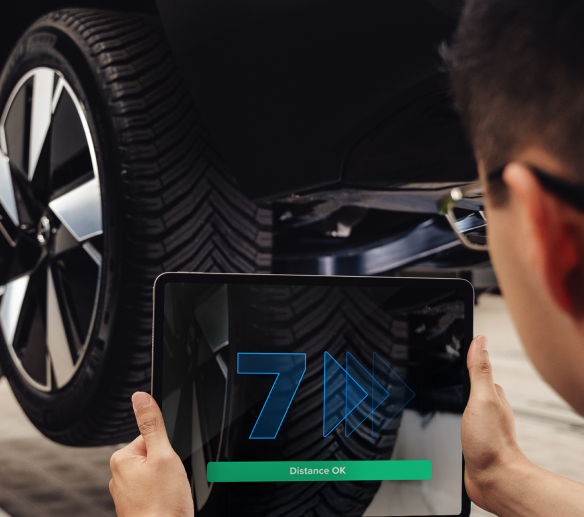
How OCR Technologies Improve the Performance of Police Officers
Data entry is an everyday part of life for most law enforcement officers. Whether on regular patrol, during traffic enforcement and even for tasks like border patrol, it is up to them to track the details from dozens of daily interactions. OCR technologies can help them.
These tasks take time and energy, with officers either taking notes by hand, or typing them into a system portal.
Any human error that occurs can lead to incorrect case records, which at best will mean time wasted resolving the problem at a later stage, and at worst, jeopardize an entire criminal case. Yet, the stressful nature of police work makes it almost an inevitability.
Jump to key topics
Jump to key topics

1. How are police officers put in stressful situations every day?
A reality of law enforcement is that officers can experience traumatic or stressful situations on any given day. The effects of a physically or psychologically traumatic event can be long-lasting. This can have a detrimental impact on both the officer’s well-being, and ability to perform their duties safely and effectively.
As those on the ‘front line’, officers will be the first to respond to a crisis call, and are frequently in direct contact with citizens who are distressed or aggressive towards them.
Here are only a few examples of the stressful situations officers deal with:
Traffic Control
Traffic control officers do more than write tickets. They put themselves in constant danger in traffic and occasionally experience high-stress chases. Also, they never know who is inside the car that they stop.
Citizen Identity checks
When officers check IDs on the streets or stop a suspicious person, they do not control that environment. Part of being a police officer is being aware of their surroundings, while also observing the behavior of those they interact with. During these interactions, citizens’ moods and actions can change rapidly, and some may become aggressive without any warning.
Border Control
Border control holds our borders, and every entry point is a place of potential danger. Time per check is a critical point, and they come into contact with people with every motive.
2. How do stressful situations make officers prone to make data entry mistakes?
Discomfort, fatigue, and other factors reduce officer’s ability to do their work accurately. When there is too much pressure on any person to meet challenging goals, it results in them working too quickly, tiring too fast, and making far more mistakes.
Humans have limitations when processing information, and police officers have to deal with a far greater amount of stimuli, from alarms, to urgent communications to requests for information and documentation. Excess workloads result in performance issues like slowing task performance, errors and lapses in judgment, and avoidable mistakes.
When it comes to recording data, these issues lead to two specific problems:
Transcription Errors
Transcription errors occur when information is put in the wrong way and is far more common when transcribing words rather than numbers. Typos, repetition, and deletion are some of these types of errors. When people rush transcription, they tend to hit the wrong keys, and it’s easy not to notice. For example, if an officer needs to type in the name of an individual from their ID or driver’s license, transcription issues can happen very easily.
Transposition Errors
Transposition errors occur when information is put in the wrong order. It tends to happen when people type numbers rather than words. Rather than typing 123, an officer types 132. It is a common error when people type too quickly. This kind of issue happens all too often when officers are running license plates and accidentally type in a combination of numbers in the opposite order.
3. Which technologies can lift this burden from police officers?
Using OCR (optical character recognition), officers can accurately scan driver’s licenses, vehicle license plates, and all forms of IDs in seconds with their mobile devices. Other data like vehicle identification numbers (VIN) and other serial numbers are easy to transpose. The ability to scan the long numbers helps reduce mistakes.
For example, Gibraltar’s police forces adopted OCR technology in 2020. Using these new digital tools as part of their mobile policing strategy, Gibraltar’s law enforcement agencies can now inspect passports, driving licenses, and vehicle license plates instantly and accurately using their smartphones.
Using this technology, officers can perform ad-hoc inspections while on patrol and at smaller entry points, such as the port and marinas, all directly from a mobile device. Mobile policing solutions give officers greater flexibility and improve situational awareness on duty by enabling them to collect the vital information they require at the click of a button.
Working with Anyline, the North-Rhine Westphalian police also developed a mobile policing solution that lets officers use their smartphones to scan the information they need when on patrol. Officers can now scan IDs, such as driver’s licenses, passports, and German national ID cards, as well as vehicle license plates and serial numbers.
4. How accurate is mobile data capture for police work?
Mobile data scanning from Anyline is extremely accurate and optimized for use in challenging conditions, including low-lighting and harsh weather. Officers can use it to scan vehicle license plates, and hundreds of ID documents, including driver’s licenses, national IDs, passports and other personal identity documents. It is up to 20x faster than entering data manually by typing on a computer or keying information into a smart device.
It’s important to recognize that everyone makes mistakes – its part of being human! Depending on the circumstance, error rates from manually imputing data can range from as low as 0.55% to 26.9%. But given the stressful situations in which law enforcement officers work, the accuracy of data captured can be compromized – and have far more serious consequences.
Mobile data capture can also play a key role in reducing miscommunication via radio between officers and precinct staff back at the station. When officers need to read data down the line – like names and plates – it can be easy for the receiver to mishear letters or numbers, and record the data incorrectly. But by replacing this with automated data entry, it’s possible for police to communicate the same information back to the station in seconds – while reducing the error rate to zero.
5. What about privacy, security, and integration?
Privacy: Is Anyline GDPR compliant?
Yes. Since the Anyline SDK does not require an internet connection and does not store any data on our or third-party servers, it is compliant with the GDPR, DSGVO, APIS, and the CCPA.
Security: Secure Data Processing
Our on-device processing and means all data captured stay safe in your closed system. In addition, Anyline has received the ISO/IEC 27001:2013 certification, a globally recognized, international standard for information security.
Integration: Which the Anyline ID Scanner SDK supports ID documents, countries, and regions?
Our mobile SDK for ID scanning extracts information from ID cards, passports, and visas. It works with the two-line standards TD-3 and TD-2 and the three-line standards TD-1, MRV-A, and MRV-B. The Universal ID scan mode supports all MRZ documents, PDF417 documents and supports several European, US, and Australian driver licenses as well as European identity cards.
Our mobile SDK for ID scanning is natively developed for iOS, Android, and UWP. Still, our ID scanner also supports common integration frameworks such as Xamarin, Cordova and React Native. The sample code can be found in our documentation, for example, projects on GitHub.
In conclusion, police forces often find themselves in high-risk and high-stress situations, with little time to waste. According to Thomas Roosen, Chief of North-Rhine Westphalia Police, “The less time needed (…) to write something down because I can just scan it once, the less risk there is that something could happen.”

